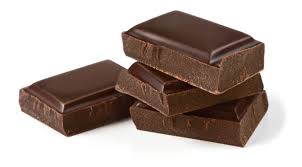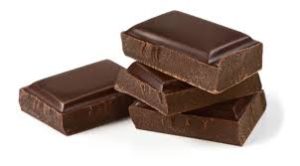 Chocolate lovers can rejoice - because another study, which was actually a review of other studies - found that frequent consumption of chocolate, cocoa, and cocoa flavanols (an ingredient of cocoa) is linked with beneficial health effects. These included cardiovascular benefits, and dose-dependent improvements in cognition, attention, and memory. In other words - the more frequently one eats chocolate and cocoa (especially dark chocolate), the more beneficial health effects. So eat and enjoy! From Medical Xpress:
Chocolate lovers can rejoice - because another study, which was actually a review of other studies - found that frequent consumption of chocolate, cocoa, and cocoa flavanols (an ingredient of cocoa) is linked with beneficial health effects. These included cardiovascular benefits, and dose-dependent improvements in cognition, attention, and memory. In other words - the more frequently one eats chocolate and cocoa (especially dark chocolate), the more beneficial health effects. So eat and enjoy! From Medical Xpress:
Cocoa and chocolate are not just treats—they are good for your cognition
A balanced diet is chocolate in both hands - a phrase commonly used to justify one's chocolate snacking behavior. A phrase now shown to actually harbor some truth, as the cocoa bean is a rich source of flavanols: a class of natural compounds that has neuroprotective effects. In their recent review published in Frontiers in Nutrition, Italian researchers examined the available literature for the effects of acute and chronic administration of cocoa flavanols on different cognitive domains. In other words: what happens to your brain up to a few hours after you eat cocoa flavanols, and what happens when you sustain such a cocoa flavanol enriched diet for a prolonged period of time?
Although randomized controlled trials investigating the acute effect of cocoa flavanols are sparse, most of them point towards a beneficial effect on cognitive performance. Participants showed, among others, enhancements in working memory performance and improved visual information processing after having had cocoa flavanols. And for women, eating cocoa after a night of total sleep deprivation actually counteracted the cognitive impairment (i.e. less accuracy in performing tasks) that such a night brings about. Promising results for people that suffer from chronic sleep deprivation or work shifts.
The effects of relatively long-term ingestion of cocoa flavanols (ranging from 5 days up to 3 months) has generally been investigated in elderly individuals. It turns out that for them cognitive performance was improved by a daily intake of cocoa flavanols. Factors such as attention, processing speed, working memory, and verbal fluency were greatly affected. These effects were, however, most pronounced in older adults with a starting memory decline or other mild cognitive impairments.
And this was exactly the most unexpected and promising result according to authors Valentina Socci and Michele Ferrara from the University of L'Aquila in Italy. "This result suggests the potential of cocoa flavanols to protect cognition in vulnerable populations over time by improving cognitive performance. If you look at the underlying mechanism, the cocoa flavanols have beneficial effects for cardiovascular health and can increase cerebral blood volume in the dentate gyrus of the hippocampus. This structure is particularly affected by aging and therefore the potential source of age-related memory decline in humans."
So should cocoa become a dietary supplement to improve our cognition? "Regular intake of cocoa and chocolate could indeed provide beneficial effects on cognitive functioning over time. There are, however, potential side effects of eating cocoa and chocolate. Those are generally linked to the caloric value of chocolate, some inherent chemical compounds of the cocoa plant such as caffeine and theobromine, and a variety of additives we add to chocolate such as sugar or milk." Nonetheless, the scientists are the first to put their results into practice: "Dark chocolate is a rich source of flavanols. So we always eat some dark chocolate. Every day." [Original study.]
 We all know sitting too much is not good for our health. But for many of us, it's our reality - sit all day at work, and then come home and relax by sitting all evening. But there is some good news. A recent study found that eating foods rich in flavanols, such as cocoa, may protect our blood vessels from the harms of too much sitting.
We all know sitting too much is not good for our health. But for many of us, it's our reality - sit all day at work, and then come home and relax by sitting all evening. But there is some good news. A recent study found that eating foods rich in flavanols, such as cocoa, may protect our blood vessels from the harms of too much sitting.
 One fear people have is of developing problems with their memory in their later years, called age-related memory loss. A recent study finding a possible way to maintain memory in older adults is intriguing and offers hope. And best of all, it's fairly easy to do - just increase the intake of flavanol rich foods.
One fear people have is of developing problems with their memory in their later years, called age-related memory loss. A recent study finding a possible way to maintain memory in older adults is intriguing and offers hope. And best of all, it's fairly easy to do - just increase the intake of flavanol rich foods.